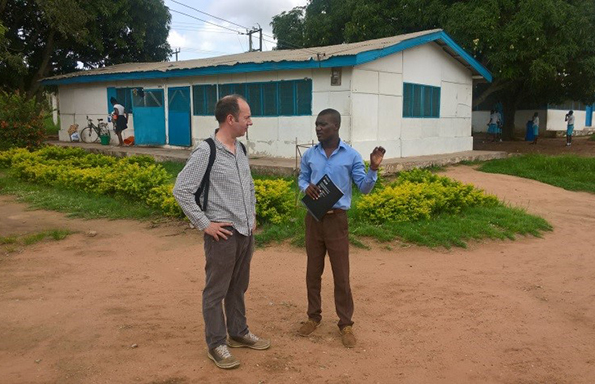
Dr Alex Balch (left) in Ghana
The University of Liverpool secured £2m to help combat slavery in Sub-Saharan Africa.
Dr Alex Balch, Co-Director of the University’s Centre for the Study of International Slavery (CSIS), is lead researcher on the project.
Dr Balch said: “Our network joins three of the main UK centres on research into slavery with leading antislavery NGOs and a range of academic and non-academic partners across West and Central Africa in Ghana, Sierra Leone and the Democratic Republic of Congo.
“This network will explore how approaches from the arts and humanities can shift antislavery efforts towards a more community-engaged, human rights focus that delivers real development impacts.”
The project is one of five major new interdisciplinary networks announced by the Arts and Humanities Research Council (AHRC), using £9m of funding from the Global Challenges Research Fund (GCRF).
Each will run from October 2017 for up to 4 years, and will showcase the distinctive contribution that arts and humanities research can bring to development in low and middle income countries.
Announced by the UK Government in November 2015, the GCRF is a £1.5 billion fund to support cutting-edge research and ensure the UK takes a leading role in global development. By working with world leading researchers and institutions, the fund contributes to addressing the complex global issues faced by developing countries.
It focuses on challenge-led, multidisciplinary research, providing an agile response to emergencies in need of urgent analysis and strengthening the UK and developing countries’ capability for research.
All five of the multi-institutional and cross-disciplinary teams will work extensively with researchers, organisations, and communities based on the ground to build partnerships and deliver effective solutions that demonstrate the importance of areas such as culture, languages, identities and local contexts as foundations for addressing development challenges.
Alongside Dr Balch’s project, funding was also secured by University of Leeds, for research into young people in post-conflict scenarios in Africa, South America and Eastern Europe; the School of Oriental Studies will look into historical and cultural approaches to democracy in politically fragile states, in particular Myanmar and Ethiopia; a project investigating the use of cultural heritage for economic growth and social cohesion in East Africa will be led by the University of Nottingham; and University College London will develop new historical research for education and post-conflict development in Iraq and neighbouring countries.
Professor Andrew Thompson, Chief Executive of the AHRC and Chair of the Research Councils UK (RCUK) Research, Innovation & Strategy Advisory Board, said: “The AHRC is delighted to support these important new networks.
“Partnerships between leading researchers in the UK and the Global South are vital in bringing innovative approaches to, and deep understanding of, some of the most pressing challenges of our time.
“The Arts and Humanities have a critical role to play in tackling development challenges, building capacity in partner countries, and laying a foundation for future collaborations in development research.”
Professor Georgina Endfield, Associate Pro Vice Chancellor for Research and Impact at the University, said: “This new interdisciplinary network tackles one of the most significant global challenges facing humanity today.
“It is a great privilege to be able to host this new network at the University of Liverpool, which has long been a centre of research on slavery through CSIS.
“This success illustrates the quality of the research undertaken in the Faculty of Humanities and Social Sciences and is testament to the hard work and talent of our colleagues.”
Dr Alex Balch’s University of Liverpool Co-Investigators on the project are Professor Larry Barham from the Department of Archaeology, Classics and Egyptology and Professor Charles Forsdick from the Department of Modern Languages and Cultures.
Dr Alex Balch used the University’s internal pump-priming fund to build relationships in Ghana that helped strengthen his AHRC proposal. The pump priming fund for 2017-18 will open soon. To find out more, please email restheme@liverpool.ac.uk